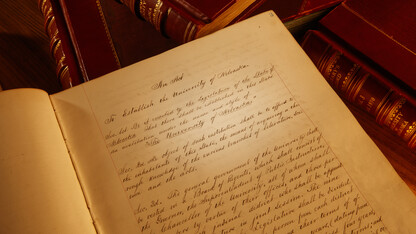
The headlines on the front pages of Nebraska’s daily newspapers seem to be contradictory: The GOP wins the night, yet an initiative to raise the minimum wage to $9 in Nebraska passes by a landslide.
Historically, the minimum wage has been a policy proposal associated with Democrats, but Nebraska, a largely Republican state, voted overwhelmingly to approve Initiative 425 in support of a higher minimum wage. So, how does a state vote on one hand for conservative politicians and on the other for an initiative most often championed by progressives?
UNL political scientist John Hibbing said the answer could lie in the roots of Nebraskans’ conservatism.
“On its face, it does seem like it’s not completely consistent,” Hibbing said. “Certainly, the minimum wage is a policy proposal that is traditionally associated with liberal-leaning groups and that doesn’t describe the political situation in Nebraska by any stretch of the imagination.
“A lot of Republicans in Nebraska feel the way they do about politics in large part because of social issues rather than economic issues, so if the Democratic candidates are advocating positions on abortion or capital punishment that you find objectionable, then it may be that you can support the minimum wage, but you’re still going to vote for the Republican candidates because of their stands on social issues.”
Also, Hibbing said, supporting the minimum wage increase doesn’t conflict with the conservative tendency to support limited government.
“The minimum wage is obviously an economic issue, but one that doesn’t involve the federal government creating a brand new program, so it’s possible to support the minimum wage and still maintain a small-government attitude,” he said.
The win for minimum-wage workers wasn’t the only surprise on Election Day, Hibbing said. Nebraska’s 2nd Congressional District rejected its eight-term Republican incumbent in favor of state senator and Democrat Brad Ashford.
“These midterm elections have been extremely favorable toward the Republicans,” he said. “They won a lot of seats previously held by Democrats, so to have a situation where an incumbent Republican loses in 2014 is really quite startling.”
Hibbing also said voter turnout – 46 percent – was surprisingly high for midterm elections.
“It may have been driven by dissatisfaction with President Obama,” he said. “It may have been driven by the fact that the minimum wage was on the ballot. It may be because we had both a gubernatorial race and a senatorial race. There are a variety of possible explanations.”







